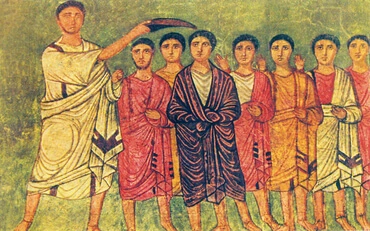9814. 'And you shall make holy garments for Aaron your brother' means a representative sign of the spiritual kingdom lying adjacent to the celestial kingdom. This is clear from the meaning of 'garments' in general as truths, and more particularly as truths clothing good, dealt with in 5954, 9212, 9216. The meaning of 'garments' as truths owes its origin to things in heaven, where angels appear dressed in clothes in keeping with the truths they have that spring from good, 165, 5248, 5954, 9212; and from this it may be recognized that Aaron's garments represented the Lord's spiritual kingdom lying adjacent to His celestial kingdom. For Aaron represented the Lord in respect of the Divine Celestial, 9810, and therefore the garments he wore represented the Divine Spiritual adjacent to the celestial kingdom like clothing next to the body, the Divine Spiritual being Divine Truth emanating from the Lord's Divine Good. It presents itself in heaven as light, indeed it is the light which illuminates both the outward and the inward powers of sight that angels possess. Modifications of this light - which are determined by the subjects, that is, the angels, that receive it - produce different visible phenomena, such as clouds, rainbows, and various colours and brightnesses; they also produce shining garments about the angels. From all this it may be recognized that the Lord's spiritual kingdom was represented by Aaron's holy garments. For there are two kingdoms into which the heavens are divided, the celestial kingdom and the spiritual kingdom, regarding which, see 9277. Those in the celestial kingdom appear naked, but those in the spiritual kingdom appear in clothing. From this it is again clear that Divine Truth, or the Divine Spiritual, which appears as light, is that which serves to clothe.
[2] But who would ever credit it that, even though the Word exists within the Church and consequently enlightenment regarding Divine and heavenly realities, ignorance reigns there, so great that no one knows that angels and spirits take on the human form, appear to themselves as human beings, and see, hear, and talk to one another? Still less does anyone know that they appear clothed in garments. The idea that they do so is met not merely with doubt but also with complete denial on the part of those so blind to everything other than external things, that they think that the body alone lives, and that what they cannot see with the eyes in their body or touch with the hands on their body has no existence whatever, see 1881. But in actual fact the heavens are full of human beings, who are angels, and these are clothed with garments shining in varied degrees of brightness. But these beings cannot at all be seen by a person on earth through the eyes of his body, only through the eyes of his spirit, when the Lord opens them. The angels who were seen by the ancients, such as Abraham, Sarah, Lot, Jacob, Joshua, Gideon, and also the Prophets, were not seen by those persons' bodily eyes but by those of their spirit which had been opened then. The fact that they would also have appeared clothed in robes is clear from the angels sitting at the Lord's tomb, whom Mary Magdalene and Mary the mother of James saw, and who were wearing shining white garments, Matthew 28:3; Mark 16:5; Luke 24:4, and in particular from the Lord Himself when seen in His glory by Peter, James, and John, in that His clothing was dazzling white and like the light, Matthew 17:2; Luke 9:29. This clothing too represented the Divine Spiritual, or the Divine Truth that emanated from Him.
[3] All this makes clear what 'white garments' means in the Book of Revelation,
You have a few names also in Sardis, who have not soiled their garments, and they will walk with Me in white ones, for they are worthy. He who conquers will be clad in white garments. Revelation 3:4-5.
'Garments' here are spiritual truths, which are truths springing from good, as shown above; and 'white' is authentic truth, 3301, 4007, 5319. The following words that occur elsewhere in the same book are similarly made clear,
I saw heaven opened, and behold, a white horse; and He who sat on it was called faithful and true, and in righteousness He judges and goes into battle. His armies in heaven were following Him, clothed in linen white and clean. Revelation 19:11, 14.
And elsewhere again in that book,
On the thrones I saw twenty-four elders, clad in white garments. Revelation 4:4.







